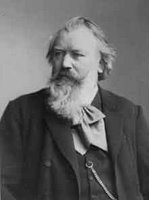
I was never able to set apart the music from the man in the case of Brahms. Everything I listen to has to sound like it's coming from the big warm heart and profound genius of the big man, cause he was a big man. I see his face a the end of his impressive stature and I can't imagine anything not being of gigantic dimensions. His laugh should be loud and sonorous, his joy could throw an entire city into celebrations, his sufferings and upsets should be like a fiery storm forming on top of a mountain, threating everything below. The symphonies themselves show a man that lived intensely and with an impressive richness of feelings and thoughts. And they take charge of his creative powers in a "winner takes all" kind of competition and sometimes two most dissonant ideas follow each other quite often at an amazing pace. It is no easy task to make this luxurious life come forward with logic and power. And yet, the last century saw some amazing achievements in this difficult task.
Symphony no. 1, C Minor, Op. 63
In my mind there are only two contestants in all 4 symphonies with some others worthy of mentioning for each symphony. As much as I would like to think only of Walter as THE Brahmsian conductor I couldn't possibly let aside Furtwangler. The two giants of last century are as different as you could possible imagine yet their results speak about the great man in the same exquisitely comprehensive manner. While Walter goes to the root of his heart Furtwangler drills deep into his mind. Yet both manage to express with amazing power, detail and command the portrait I desribed in the introduction. I prefer Walter as the interpret of the soul in its full expression but you have to listen to Furtwangler to see how feelings are formed in the brain. Both of them will grab you and immerse in the see of human struggle with its passions like no others. A very good version comes from Klemperer, a little more cerebral and not so inclined to abandon. If you would like to see how all these things form and mix with each other you have to listen to Celibidache's version as he's as usual able to throw light on the darkest corners of creation.
Symphony no. 2, D Major, Op. 73
In this symphony Walter has no competition. This pastoral symphony could have been composed for him. Everything is right and you can feel the internal strangth of the music pulsating and giving life to things. Furtwangler is again a good choice as well as Celibidache. Just take care that Celi's dissecting abilities aren't as rewarding this time, as you'd prefer the beauty of the whole and of the great lines.

Symphony no. 3, F Major, Op. 90
The bearer of what is probably the most famous of Brahms' pieces, its third part (featured in the movie "Goodbye again") it's a very difficult one as you have less space and no particular predominent idea to guide you. It's telling without too much involvement what's happening in one man's head as he contemplates the view form his window, waiting for the sun to come up and try to make sense out of things. The guy is still Brahms so expect some strong feelins to emerge yet none of them leads to action and they die in the arms of the next one. Walter is again my favourite for this symphony, the third part is absolutely superb and overall, everything sounds so right. I wouldn't pick Furtwangler this time and if you want an alternative badly, then you might try Szell or Reiner.
Symphony no. 4, E Minor, Op. 98
The 4th symphony sounds like it knows is the last. Walter plays it almost the same way and a good part of the dynamics and the fluent energy that make the first three symphonies cornerstone versions, just lack here. It is still a go
 od account yet not on the same class as the others. Anyway, this is the moment where Furtwangler comes into play and takes this symphony at the height of Brahms' genius. His view is so romantic and of so larger than life dimensions that you have no chance left than to believe that this is one of the great symphonies of humankind. Also a good option here is Klemperer. This time his landmark granitic sound and cerebral approach does a lot of good and does a lot of justice to this great composition.
od account yet not on the same class as the others. Anyway, this is the moment where Furtwangler comes into play and takes this symphony at the height of Brahms' genius. His view is so romantic and of so larger than life dimensions that you have no chance left than to believe that this is one of the great symphonies of humankind. Also a good option here is Klemperer. This time his landmark granitic sound and cerebral approach does a lot of good and does a lot of justice to this great composition.To wrap up it is obvious by now that I would encourage everybody to have at least to sets of Brahms' symphonies. The one of Walter's from Sony and any of Furtwangler's two currently on the market. Of course there other places to go if you don't find these fullfilling yet keep them close to you as you owe it to yourself to hear what these guys have to say.
No comments:
Post a Comment